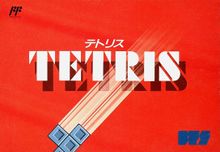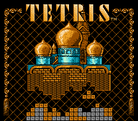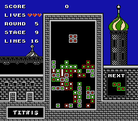Tetris (Famicom): Difference between revisions
m →Gameplay: specify which computer versions |
m control scheme details |
||
| Line 3: | Line 3: | ||
|publisher = [[Bullet Proof Software]] | |publisher = [[Bullet Proof Software]] | ||
|released = December 22, 1988 | |released = December 22, 1988 | ||
|platform = | |platform = Family Computer | ||
|preview = 1 | |preview = 1 | ||
|playfield = 10 × 20 | |playfield = 10 × 20 | ||
| Line 13: | Line 13: | ||
|ingame-scrn = Tetris (Famicom) ingame.png | |ingame-scrn = Tetris (Famicom) ingame.png | ||
}} | }} | ||
'''''Tetris''''' for Famicom is a port of the [[Tetris (BPS)|Japanese home computer | '''''Tetris''''' for the Family Computer (Famicom) is a port of the [[Tetris (BPS)|Japanese home computer versions]]. Originally published under an incorrect license, the game led to [[Henk Rogers]]'s purchase of the Tetris license on multiple platforms, which later led directly to further [[Nintendo]] releases. | ||
It is infamous for its control scheme, which mapped down to rotate, and A to [[hard drop]], the opposite of most later versions which have down for drop and A for rotate. | It is infamous for its control scheme, which mapped down to rotate, and A to [[hard drop]], the opposite of most later versions which have down for drop and A for rotate. This was due to adapting the keyboard control scheme from the computer ports directly to the control pad on the Famicom. | ||
On October 1st, [[2018 in Tetris|2018]] the game was re-released as part of the [[AtGames]] Legends Flashback. It has an updated copyright screen and remapped controls (up/B for rotate, down/A/C for hard drop). On November 1st, [[2019 in Tetris|2019]], it was re-released on the updated Legends Flashback, Legends Ultimate Arcade, and the Adventure Flashback Blast!. | On October 1st, [[2018 in Tetris|2018]] the game was re-released as part of the [[AtGames]] Legends Flashback. It has an updated copyright screen and remapped controls (up/B for rotate, down/A/C for hard drop). On November 1st, [[2019 in Tetris|2019]], it was re-released on the updated Legends Flashback, Legends Ultimate Arcade, and the Adventure Flashback Blast!. | ||
Revision as of 23:58, 26 June 2024
| Tetris | |
|---|---|
 | |
| Developer(s) | Bullet Proof Software |
| Publisher(s) | Bullet Proof Software |
| Platform(s) | Family Computer |
| Release | December 22, 1988 |
| Gameplay info | |
| Next pieces | 1 |
| Playfield size | 10 × 20 |
| Hold piece | No |
| Hard drop | Hard only |
| Rotation system | Unique with random spawns |
Tetris for the Family Computer (Famicom) is a port of the Japanese home computer versions. Originally published under an incorrect license, the game led to Henk Rogers's purchase of the Tetris license on multiple platforms, which later led directly to further Nintendo releases.
It is infamous for its control scheme, which mapped down to rotate, and A to hard drop, the opposite of most later versions which have down for drop and A for rotate. This was due to adapting the keyboard control scheme from the computer ports directly to the control pad on the Famicom.
On October 1st, 2018 the game was re-released as part of the AtGames Legends Flashback. It has an updated copyright screen and remapped controls (up/B for rotate, down/A/C for hard drop). On November 1st, 2019, it was re-released on the updated Legends Flashback, Legends Ultimate Arcade, and the Adventure Flashback Blast!.
Gameplay
Gameplay is based on BPS's Japanese computer versions. The aim is to clear a series of stages. There are 6 rounds of 10 stages, and there are 25 lines to clear to advance to the next stage, with the screen cleared after each stage. Each stage has increasing gravity, while each round has increasing garbage height. The player has three lives, allowing two top outs without ending the game.
After clearing stage 9 on a given round the game continues to level 0 on the next round. If round 5 stage 9 is cleared the game shows an ending screen then loops back to round 5 stage 0.
The speeds of each stage are as follows:
| Stage | Frames per row |
|---|---|
| 0 | 80 |
| 1 | 65 |
| 2 | 50 |
| 3 | 40 |
| 4 | 32 |
| 5 | 25 |
| 6 | 20 |
| 7 | 17 |
| 8 | 15 |
| 9 | 13 |
| ||||||||

